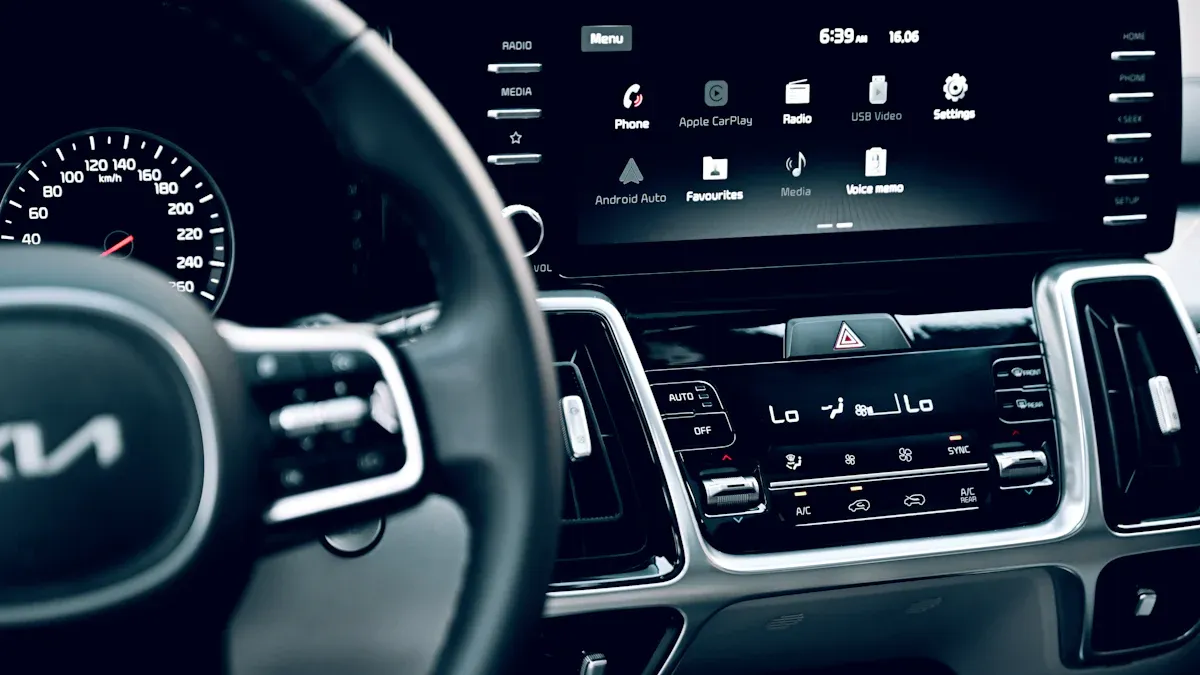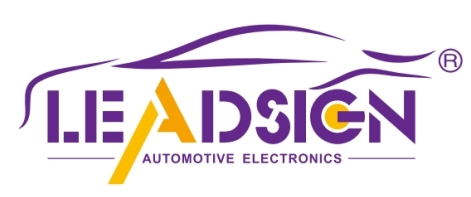Apple CarPlay Adapter for Cars Without CarPlay Wired vs Wireless Comparison

Choosing between a wired and wireless CarPlay can be confusing, especially when considering an apple CarPlay adapter for car use. Understanding the main differences can help you make an informed decision. Wired CarPlay provides a steady connection and charges your phone, while wireless CarPlay is cable-free, offering more convenience. Ultimately, choose based on your needs—whether you prioritize stability, ease of use, or charging capabilities.
Key Takeaways
Wired CarPlay gives a steady connection and charges your phone. It’s great for long drives when you need power and stability.
Wireless CarPlay is easy to use since it skips cables. It connects automatically when your car starts, keeping your dashboard neat.
Think about how you drive and if your car works with CarPlay. Tools like LEADSIGN let older cars use new features.
Wired CarPlay Overview
How Wired CarPlay Works
Wired Apple CarPlay links your iPhone to your car using a USB cable. When you plug in your phone, the car’s screen switches to Apple’s simple design. You can use apps like Maps, Music, and Messages on the car’s display. This starts when you turn on your car or reset the system. The USB port and Bluetooth get ready to connect. Then, audio and video streams are set up to work smoothly.
Wired CarPlay was first shown at WWDC 2013 as "iOS in the Car." It was made to help drivers stay safe and use their phones easily without distractions.
Advantages of Wired CarPlay
Wired CarPlay has many good points that make it dependable:
Charge-on-the-go: Your iPhone charges while connected, so no dead battery worries.
Smooth audio sync: The wired link keeps music and calls clear and in sync.
Reliable connection: A wired setup is less likely to disconnect suddenly compared to wireless.
This option is great if you want a steady and reliable experience. It’s perfect for long trips where charging and staying connected matter most.
Disadvantages of Wired CarPlay
Wired Apple CarPlay has some downsides too:
The USB cable limits how far you can move your phone, making it harder to use while driving.
Finding the USB port can be tough, especially if it’s hidden or hard to reach.
Sharing control with others is tricky. You’ll need to unplug and reconnect the cable if someone else wants to use their phone.
Old or broken cables can mess up your CarPlay, causing frustration.
Even with these issues, wired CarPlay is still liked for its steady connection and charging ability.
Wireless CarPlay Overview
How Wireless CarPlay Works
Wireless Apple CarPlay connects your iPhone using Bluetooth and Wi-Fi. First, Bluetooth pairs your phone with the car. Then, Wi-Fi handles bigger tasks like music streaming or maps. This setup keeps things running smoothly. Some adapters, like the Lesswire Wireless CarPlay Adapter, help keep the connection steady, even on long trips.
This system removes the need for cables. It makes using apps like Maps or Music easier. Once set up, it connects automatically when you start your car. This saves time and effort.
Advantages of Wireless CarPlay
Wireless CarPlay has many benefits that drivers enjoy:
No cables needed: Keep your dashboard neat and move freely.
Automatic connection: Your phone links when the car starts.
Enhanced convenience: Share your phone without losing the connection.
Voice commands: Use Siri to control things hands-free.
Real-time navigation: Get live traffic updates with apps like Apple Maps.
Adapters like CarlinKit and Ottocast work well with many cars. They make wireless CarPlay a smart choice.
Disadvantages of Wireless CarPlay
Wireless Apple CarPlay has some downsides too:
Connectivity issues: The connection might drop unexpectedly.
Audio quality: Sound may not be as clear as wired setups.
Compatibility limits: Some cars or devices may not support it.
Switching devices: Changing between phones can be hard.
Even with these problems, wireless CarPlay is still loved for its ease and modern features.
Wired vs Wireless CarPlay: Key Comparisons
Connectivity and Setup
Wired CarPlay connects your iPhone with a USB cable. It’s simple—just plug in, and it works. Wireless CarPlay uses Bluetooth to pair and Wi-Fi for data. It removes cables but takes longer to set up.
Wired CarPlay | Wireless CarPlay | |
|---|---|---|
Prerequisites | iPhone 5 or newer, iOS 7.1, compatible car | Car with wireless CarPlay or adapter |
Connection Method | USB cable (Lightning to USB-A) | Bluetooth and Wi-Fi via adapter or built-in |
Setup Steps | Plug iPhone into USB port, enable CarPlay | Pair iPhone with Bluetooth, tap CarPlay icon |
If you want quick setup, wired CarPlay is easier. But wireless CarPlay offers no cables, which many prefer.
Convenience and Usability
Wired CarPlay is easy but keeps your phone stuck by the cable. Wireless CarPlay lets you move your phone freely. It connects automatically when the car starts, saving time. If you like convenience, wireless CarPlay is better.
Performance and Reliability
Wired CarPlay gives steady performance with no connection drops. It plays audio perfectly and keeps navigation smooth. Wireless CarPlay can lose connection or have sound delays. For long trips, wired CarPlay is more dependable.
Metric | Wired CarPlay | Wireless CarPlay |
|---|---|---|
Connection Stability | Strong and steady connection | May drop or lag |
Audio and Video Synchronization | No delays, always in sync | Might have slight delays |
Compatibility with Cars and Devices
Wired CarPlay works with most cars that have USB ports. Wireless CarPlay needs a system or adapter that supports it. If your car doesn’t have wireless, adapters like LEADSIGN can help. This makes wireless CarPlay usable in older cars.
Charging Capabilities
Wired CarPlay charges your phone while you use it. This keeps your phone powered on long drives. Wireless CarPlay doesn’t charge your phone. You’ll need a separate charger, which can clutter your car. If charging matters, wired CarPlay is the better choice.
Upgrading Cars Without Built-In CarPlay
Using an Apple CarPlay Adapter for Cars
If your car doesn’t have CarPlay, don’t worry. You can still use its features with an Apple CarPlay adapter. These adapters connect your iPhone to your car’s system. They work with either a wired or wireless connection. This is a simple way to add modern tech to older cars without changing the whole stereo.
For example, the LEADSIGN adapter works well with many cars, like BMWs. It supports both wired and wireless CarPlay, giving you options. It’s easy to install and offers features like maps, music, and hands-free calls. Some adapters even include extras like screen mirroring and USB video playback. These features make driving smarter and more fun.
Installing Aftermarket Head Units
Another choice is adding an aftermarket head unit. These replace your car’s stereo and include built-in CarPlay. Products like INTELLIDASH Plus are popular because they’re easy to set up. They also offer extras like SiriusXM and YouTube. Plus, they’re portable, so you can use them in different cars.
Some cars, like the 2015 Honda Civic, may need extra parts like wiring harnesses. This can make it cost more, especially with professional installation. But the result is worth it. You’ll get a fully working CarPlay system that improves your car’s features.
Professional Installation vs DIY Options
When upgrading, you can choose professional installation or do it yourself. Professional installation costs more but includes a warranty. It also ensures everything works correctly. This is a good option if you’re not comfortable with tools and wires.
DIY installation is cheaper but takes more time and effort. You’ll need to follow instructions carefully to avoid problems. If you like hands-on projects and are good with tech, this can be a fun option.
Aspect | Professional Installation | DIY Installation |
|---|---|---|
Cost | Higher due to labor and expertise | Lower, saves on labor costs |
Warranty | Typically includes warranty on product and labor | No warranty, risk of issues post-install |
System Check | Full system check included | No system check, potential compatibility issues |
Time and Effort | Less time and effort required | More time and effort needed |
Whether you pick an Apple CarPlay adapter or an aftermarket head unit, upgrading your car makes driving better.
Picking between wired and wireless CarPlay depends on your needs. Wired CarPlay gives a steady connection and charges your phone. This makes it great for long trips or if you want stability. Wireless CarPlay removes cables and connects automatically. It’s perfect for people who like convenience.
Feature | Wired CarPlay | Wireless CarPlay |
|---|---|---|
Connection Reliability | Strong and steady | Might disconnect sometimes |
Charging | Charges your phone | Does not charge your phone |
Convenience | Limited by cables | Move freely without wires |
Think about your car and how you drive before choosing. If your car doesn’t have wireless CarPlay, adapters like LEADSIGN can help. No matter which you pick, upgrading CarPlay makes driving easier and more fun.
FAQ
1. Can I use a wireless CarPlay adapter in any car?
Not every car works with wireless CarPlay adapters. Check if your car supports it. For older cars, try adapters like the LEADSIGN model.
2. Does wireless CarPlay drain my phone’s battery faster?
Yes, it uses Bluetooth and Wi-Fi, which use more power. Bring a charger for long drives to avoid a dead battery.
3. Is professional installation necessary for CarPlay adapters?
No, most adapters are easy to set up yourself. But professional help ensures everything works, especially for tricky systems or new head units.
See Also
Comprehensive Guide to Apple CarPlay Adapters for Non-Compatible Cars
Exploring Wireless Features and Trade-offs of Apple CarPlay Adapters
Top Reviewed Wireless Solutions for Apple CarPlay Adapters
Understanding the Differences Between Wired and Wireless CarPlay Adapters
Genuine Reviews of Apple CarPlay Adapters for Non-CarPlay Vehicles

